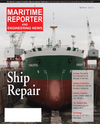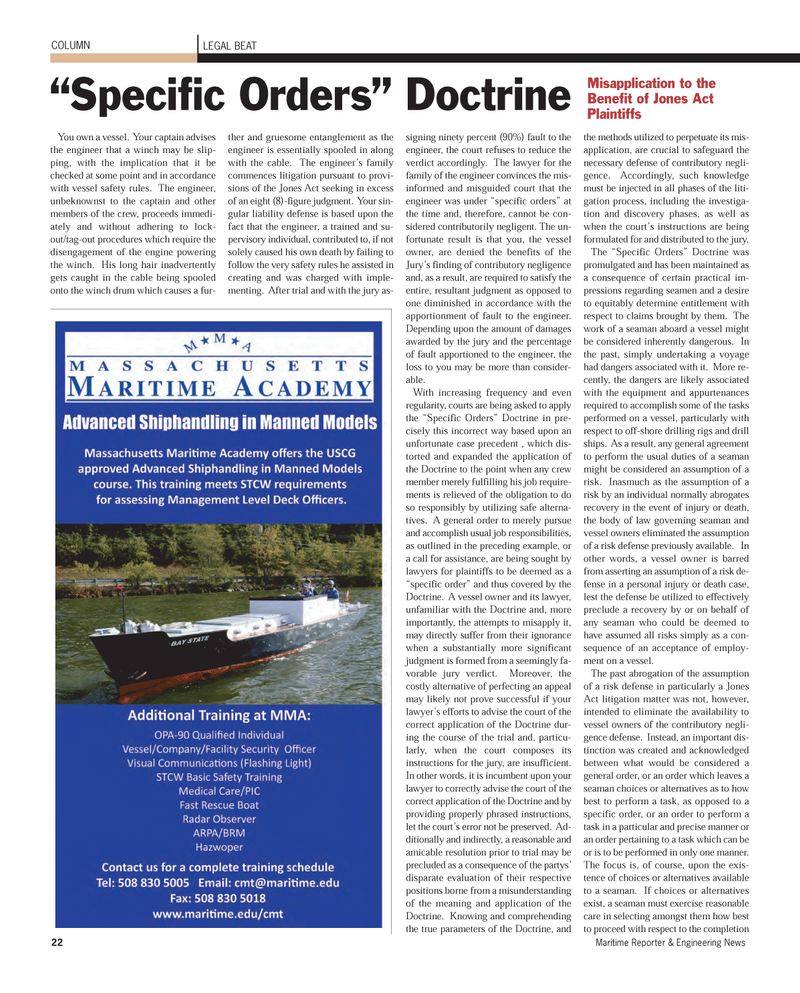
Page 22: of Maritime Reporter Magazine (March 2012)
The Ship Repair Edition
Read this page in Pdf, Flash or Html5 edition of March 2012 Maritime Reporter Magazine
You own a vessel. Your captain advises the engineer that a winch may be slip-ping, with the implication that it bechecked at some point and in accordance with vessel safety rules. The engineer, unbeknownst to the captain and other members of the crew, proceeds immedi- ately and without adhering to lock-out/tag-out procedures which require thedisengagement of the engine powering the winch. His long hair inadvertently gets caught in the cable being spooledonto the winch drum which causes a fur- ther and gruesome entanglement as theengineer is essentially spooled in alongwith the cable. The engineer?s family commences litigation pursuant to provi- sions of the Jones Act seeking in excess of an eight (8)-figure judgment. Your sin- gular liability defense is based upon thefact that the engineer, a trained and su- pervisory individual, contributed to, if not solely caused his own death by failing to follow the very safety rules he assisted in creating and was charged with imple- menting. After trial and with the jury as- signing ninety percent (90%) fault to the engineer, the court refuses to reduce the verdict accordingly. The lawyer for the family of the engineer convinces the mis- informed and misguided court that theengineer was under ?specific orders? at the time and, therefore, cannot be con-sidered contributorily negligent. The un- fortunate result is that you, the vessel owner, are denied the benefits of the Jury?s finding of contributory negligence and, as a result, are required to satisfy theentire, resultant judgment as opposed toone diminished in accordance with theapportionment of fault to the engineer. Depending upon the amount of damagesawarded by the jury and the percentage of fault apportioned to the engineer, the loss to you may be more than consider- able. With increasing frequency and even regularity, courts are being asked to apply the ?Specific Orders? Doctrine in pre- cisely this incorrect way based upon an unfortunate case precedent , which dis-torted and expanded the application of the Doctrine to the point when any crew member merely fulfilling his job require- ments is relieved of the obligation to do so responsibly by utilizing safe alterna- tives. A general order to merely pursue and accomplish usual job responsibilities,as outlined in the preceding example, or a call for assistance, are being sought bylawyers for plaintiffs to be deemed as a ?specific order? and thus covered by the Doctrine. A vessel owner and its lawyer, unfamiliar with the Doctrine and, more importantly, the attempts to misapply it, may directly suffer from their ignorance when a substantially more significant judgment is formed from a seemingly fa- vorable jury verdict. Moreover, the costly alternative of perfecting an appeal may likely not prove successful if your lawyer?s efforts to advise the court of the correct application of the Doctrine dur- ing the course of the trial and, particu- larly, when the court composes its instructions for the jury, are insufficient. In other words, it is incumbent upon your lawyer to correctly advise the court of the correct application of the Doctrine and byproviding properly phrased instructions, let the court?s error not be preserved. Ad- ditionally and indirectly, a reasonable and amicable resolution prior to trial may beprecluded as a consequence of the partys?disparate evaluation of their respective positions borne from a misunderstandingof the meaning and application of theDoctrine. Knowing and comprehending the true parameters of the Doctrine, andthe methods utilized to perpetuate its mis-application, are crucial to safeguard the necessary defense of contributory negli- gence. Accordingly, such knowledge must be injected in all phases of the liti-gation process, including the investiga- tion and discovery phases, as well as when the court?s instructions are being formulated for and distributed to the jury. The ?Specific Orders? Doctrine was promulgated and has been maintained as a consequence of certain practical im-pressions regarding seamen and a desire to equitably determine entitlement withrespect to claims brought by them. The work of a seaman aboard a vessel might be considered inherently dangerous. Inthe past, simply undertaking a voyage had dangers associated with it. More re-cently, the dangers are likely associated with the equipment and appurtenancesrequired to accomplish some of the tasksperformed on a vessel, particularly with respect to off-shore drilling rigs and drill ships. As a result, any general agreement to perform the usual duties of a seamanmight be considered an assumption of arisk. Inasmuch as the assumption of arisk by an individual normally abrogates recovery in the event of injury or death, the body of law governing seaman and vessel owners eliminated the assumption of a risk defense previously available. In other words, a vessel owner is barred from asserting an assumption of a risk de-fense in a personal injury or death case,lest the defense be utilized to effectively preclude a recovery by or on behalf of any seaman who could be deemed to have assumed all risks simply as a con- sequence of an acceptance of employ- ment on a vessel. The past abrogation of the assumption of a risk defense in particularly a JonesAct litigation matter was not, however, intended to eliminate the availability to vessel owners of the contributory negli- gence defense. Instead, an important dis-tinction was created and acknowledged between what would be considered a general order, or an order which leaves a seaman choices or alternatives as to how best to perform a task, as opposed to aspecific order, or an order to perform a task in a particular and precise manner oran order pertaining to a task which can beor is to be performed in only one manner. The focus is, of course, upon the exis- tence of choices or alternatives available to a seaman. If choices or alternatives exist, a seaman must exercise reasonable care in selecting amongst them how best to proceed with respect to the completion22Maritime Reporter & Engineering News ?Specific Orders? Doctrine Misapplication to the Benefit of Jones Act Plaintiffs COLUMNLEGAL BEAT MR March 12 # 3 (17-24):MR Template 3/1/2012 11:27 AM Page 22

 21
21

 23
23
